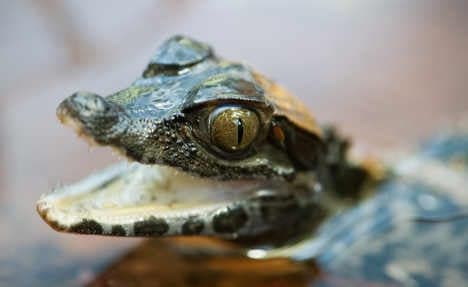Zoo changes crocodile's name in political row

A zoo in Saxony is re-naming Fidel the crocodile, who is of Cuban descent, after cultural groups voiced concerns about associations with Communist revolutionary Fidel Castro.
Fidel is one of seven Cuban crocodiles - an endangered species - to have hatched in Hoyerswerda zoo last August. Zookeepers opted to give the hatchlings names associated with their traditional homeland.
“We were simply looking for names which you immediately associate with their homeland of Cuba,” said director of the zoo in formerly Communist East Germany Carmen Lötsch. “Nobody intended it to be a direct reference to dictator Fidel Castro or indeed a glorification of him as a person,” she said.
Fidel the crocodile was destined for a life in the limelight, however, as he soon gained notoriety for his aggressive behavior towards his siblings, whom he would regularly attack and bite.
These misdemeanors earned him the nickname “Castro” in some circles. “But that really refers most of all to the critical aspects of Fidel Castro as a person, so one can really not be accused of in any way trivializing these actions,” said Lötsch.
However a committee tasked with allocating cultural funding in the region, did not share that view, claiming the crocodile’s name was not consistent with its guidelines.
The institution last year provided the zoo with €400,000, without which it would not have been able to survive.
When it emerged that Fidel was attracting political comparisons it appealed to the zoo to be more sensitive in using certain terms.
“The cultural body is one of our most import partners and ensures the survival of Hoyerswerda zoo. We therefore take its displeasure regarding the name very seriously, even if we cannot entirely understand it,” Lötsch said.
Though Fidel may have become associated with being radical, his name change was anything but. He is now called “Fidelio.”
But by attracting so much attention to his species, of which only 4,000 remain in the wild, the young crocodile may well be living up to the revolutionary potential with which he has become unintentionally endowed.
And in a further twist to the tale, the name “Fidelio” may not stick for long either. Zookeepers do not actually have proof that the crocodile is male, since this requires a blood test to which the hatchlings have not yet been subjected.
However, keepers have prepared for this eventuality and chosen the name “Fidelia,” should the crocodile turn out to be female.
Comments
See Also
Fidel is one of seven Cuban crocodiles - an endangered species - to have hatched in Hoyerswerda zoo last August. Zookeepers opted to give the hatchlings names associated with their traditional homeland.
“We were simply looking for names which you immediately associate with their homeland of Cuba,” said director of the zoo in formerly Communist East Germany Carmen Lötsch. “Nobody intended it to be a direct reference to dictator Fidel Castro or indeed a glorification of him as a person,” she said.
Fidel the crocodile was destined for a life in the limelight, however, as he soon gained notoriety for his aggressive behavior towards his siblings, whom he would regularly attack and bite.
These misdemeanors earned him the nickname “Castro” in some circles. “But that really refers most of all to the critical aspects of Fidel Castro as a person, so one can really not be accused of in any way trivializing these actions,” said Lötsch.
However a committee tasked with allocating cultural funding in the region, did not share that view, claiming the crocodile’s name was not consistent with its guidelines.
The institution last year provided the zoo with €400,000, without which it would not have been able to survive.
When it emerged that Fidel was attracting political comparisons it appealed to the zoo to be more sensitive in using certain terms.
“The cultural body is one of our most import partners and ensures the survival of Hoyerswerda zoo. We therefore take its displeasure regarding the name very seriously, even if we cannot entirely understand it,” Lötsch said.
Though Fidel may have become associated with being radical, his name change was anything but. He is now called “Fidelio.”
But by attracting so much attention to his species, of which only 4,000 remain in the wild, the young crocodile may well be living up to the revolutionary potential with which he has become unintentionally endowed.
And in a further twist to the tale, the name “Fidelio” may not stick for long either. Zookeepers do not actually have proof that the crocodile is male, since this requires a blood test to which the hatchlings have not yet been subjected.
However, keepers have prepared for this eventuality and chosen the name “Fidelia,” should the crocodile turn out to be female.
Join the conversation in our comments section below. Share your own views and experience and if you have a question or suggestion for our journalists then email us at [email protected].
Please keep comments civil, constructive and on topic – and make sure to read our terms of use before getting involved.
Please log in here to leave a comment.